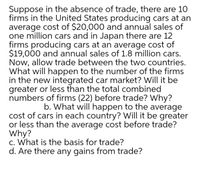Suppose in the absence of trade, there are 10 firms in the United States producing cars at an average cost of $20,000 and annual sales of one million cars and in Japan there are 12 firms producing cars at an average cost of $19,000 and annual sales of 1.8 million cars. Now, allow trade between the two countries. What will happen to the number of the firms in the new integrated car market? Will it be greater or less than the total combined numbers of firms (22) before trade? Why? b. What will happen to the average cost of cars in each country? Will it be greater or less than the average cost before trade? Why? c. What is the basis for trade? d. Are there any gains from trade?
Suppose in the absence of trade, there are 10 firms in the United States producing cars at an average cost of $20,000 and annual sales of one million cars and in Japan there are 12 firms producing cars at an average cost of $19,000 and annual sales of 1.8 million cars. Now, allow trade between the two countries. What will happen to the number of the firms in the new integrated car market? Will it be greater or less than the total combined numbers of firms (22) before trade? Why? b. What will happen to the average cost of cars in each country? Will it be greater or less than the average cost before trade? Why? c. What is the basis for trade? d. Are there any gains from trade?
Oh no! Our experts couldn't answer your question.
Don't worry! We won't leave you hanging. Plus, we're giving you back one question for the inconvenience.
Submit your question and receive a step-by-step explanation from our experts in as fast as 30 minutes.
You have no more questions left.
Message from our expert:
Hi and thanks for your question! Unfortunately we cannot answer this particular question due to its complexity.
We've credited a question back to your account. Apologies for the inconvenience.
Your Question:

Transcribed Image Text:Suppose in the absence of trade, there are 10
firms in the United States producing cars at an
average cost of $20,000 and annual sales of
one million cars and in Japan there are 12
firms producing cars at an average cost of
$19,000 and annual sales of 1.8 million cars.
Now, allow trade between the two countries.
What will happen to the number of the firms
in the new integrated car market? Will it be
greater or less than the total combined
numbers of firms (22) before trade? Why?
b. What will happen to the average
cost of cars in each country? Will it be greater
or less than the average cost before trade?
Why?
c. What is the basis for trade?
d. Are there any gains from trade?
Recommended textbooks for you

Principles of Economics 2e
Economics
ISBN:
9781947172364
Author:
Steven A. Greenlaw; David Shapiro
Publisher:
OpenStax

Principles of Microeconomics
Economics
ISBN:
9781305156050
Author:
N. Gregory Mankiw
Publisher:
Cengage Learning

Principles of Economics, 7th Edition (MindTap Cou…
Economics
ISBN:
9781285165875
Author:
N. Gregory Mankiw
Publisher:
Cengage Learning

Principles of Economics 2e
Economics
ISBN:
9781947172364
Author:
Steven A. Greenlaw; David Shapiro
Publisher:
OpenStax

Principles of Microeconomics
Economics
ISBN:
9781305156050
Author:
N. Gregory Mankiw
Publisher:
Cengage Learning

Principles of Economics, 7th Edition (MindTap Cou…
Economics
ISBN:
9781285165875
Author:
N. Gregory Mankiw
Publisher:
Cengage Learning



Essentials of Economics (MindTap Course List)
Economics
ISBN:
9781337091992
Author:
N. Gregory Mankiw
Publisher:
Cengage Learning
